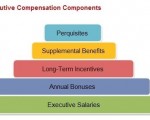
Elements of Executive Compensation
At the heart of most executive compensation plans is the idea that executives should be rewarded if the organization grows in profitability and value over a period of years. Because ...
Skill Based Pay
Skill-based pay refers to a pay system in which pay increases are linked to the number or depth of skills an employee acquires and applies and it is a means of developing broader and ...

Two objectives influence executive compensation
Two objectives influence executive compensation:
<=1=> Ensuring that the total compensation packages for executives are competitive with the compensation packages in other firms ...

What Are the Components of Executive Compensation?
=> Base salary
=> Incentive pay, with a short-term focus, usually in the form of a bonus
=> Incentive pay, with a long-term focus, usually in some combination of stock awards, option ...

Executive Compensation
Compensation or remuneration for the executive managers is different from compensation for other employees in most the organizations. Executive compensation covers employees that include ...
What are the critical issues in union settings?
Compensation is a collective bargaining issue in union settings, so the union must partner in the design process. There are many SBP examples in union settings, and SBP designs do not ...

Pay for knowledge / Pay for skills Compensation
Pay for knowledge and pay for skill compensation systems reward employees with higher pay as an incentive for the increased knowledge or skills they acquire.
(adsbygoogle = ...

The purpose of Incentives as Nontraditional Compensation
Employees who work under a financial incentive system find that their performance determines their pay in whole or in part. As a result, incentives reinforce performance on a regular ...

Objective of Compensation
(adsbygoogle = window.adsbygoogle || []).push({});
The objective of the compensation function is to create a system of rewards that is equitable to the employer and employee ...

Compensation and Employee Motivation
A majority of human resources professionals appear to believe that employees are likely to over-report the importance of pay in employee surveys. However, research suggests the opposite ...
